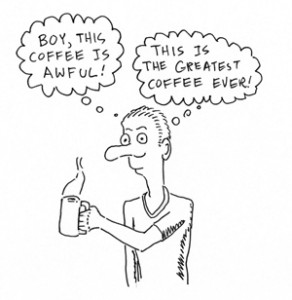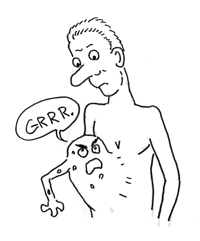Conservative-but-sane writer Ross Douthat has an interesting recent column which tackles a question that I’ve wrestled with often: why be good?
The column is actually a response to an article that scientist/atheist Jerry Coyne wrote in response to a previous column Douthat penned espousing a traditional Christian world view. I’ve read some of Coyne’s blog and he seems like an interesting guy from whom I’d like to read more, but I think he’s wrong in this battle with Douthat.
Coyne argues two points: One is that the universe is an empty place with no God or higher being or whatever you want to call it. (This point I basically agree with.) He then argues that we can still have meaning in our lives. He says:
Most of the universe is cold, bleak, airless, and uninhabitable. In fact, such a cosmology harmonizes far better with a secular moral picture than a religious one. Secularists see a universe without apparent purpose and realize that we must forge our own purposes and ethics, not derive them from a God for which there’s no evidence.
Yes, secularism does propose a physical and purposeless universe, and many (but not all) of us accept the notion that our sense of self is a neuronal illusion. But although the universe is purposeless, our lives aren’t. This conflation of a purposeless universe (i.e., one not created by a transcendent being for a specific reason) with purposeless human lives is a trick that the faithful use to make atheism seem dark and nihilistic. But we make our own purposes, and they’re real. Right now my purpose is to write this piece, and then I’ll work on a book I’m writing, and later I’ll have dinner with a friend. Soon I’ll go to Poland to visit more friends. Maybe later I’ll read a nice book and learn something. Soon I’ll be teaching biology to graduate students. Those are real purposes, not the illusory purposes to which Douthat wants us to devote our only life.
I’d argue that Coyne is conflating the terms “intent” with “purpose.” You might reasonably say, “I intend to eat this hamburger,” but it would sound funny to say, “My purpose is to eat this hamburger.” What’s the difference between the two words? Well, all language is at its core vague, but there’s a moral aspect to purpose. It’s not just something you intend to do, it’s something you should do. (According to… God, the universe, who knows…?) Coyne is applying the word purpose to activities that have no moral realm (dining, teaching, traveling.) According to that logic a serial killer could comfortably say, “My purpose is to rape and torture these teenage girls for several days in this bunker. Then I’ll have a donut.”
Later, Douthat quotes more of Coyne.
As for where altruism comes from, who knows? My own suspicions are that it’s partly genetic and partly cultural, but what’s important is that we feel it and can justify it. I can justify it on several grounds, including that altruism makes for a more harmonious society, helps those in need, and, as a selfish motive, that being altruistic gains you more respect. None of this justification has anything to do with God.
In effect, Coyne is answering the question “why be good?” But his response is so lame I suspect it would be laughed out of an entry level philosophy classroom. Why should we help each other? Because it creates a harmonious society. What’s a harmonious society? It’s a society where people help each other. Thanks, Brainiac.
The point that altruism should be motivated by the drive for respect is easily dismantled by Douthat.
…that only holds so long as the altruistic choice comes at a relatively low cost: If you’re a white Southerner debating whether to speak out against a lynching party or a Dutch family contemplating whether to hide your Jewish neighbors from the SS, the respect factor isn’t really in play — as, indeed, it rarely is in any moral dilemma worthy of the name. (And of course, depending on your ideas about harmony and stability, Coyne’s “harmonious society” argument might also seem like a case against opposing Jim Crow or anti-Semitism — because why rock the boat on behalf of a persecuted minority when stability and order are the greater goods?)
In essence I think both Coyne and Douthat are half right. I think Coyne is correct that there is no God and essentially no meaning to the universe. I think he’s wrong that we can magically manufacture meaning or purpose out of thin air. I think Douthat is wrong with his Christian worldview, but he’s right that secular naturalism (or whatever it’s called) has no means to demand moral actions; indeed, it dispenses with the notion of morality at all.
Maybe these issues will eventually be hashed out, but Coyne’s attempt is quite weak.
Thus I have spoken.
 A while back I was considering an idea for a fiction character. The conceit was that the character had multiple consciousnesses in their brain, but each consciousness generally arrived at the same decisions. So, if this person received a coffee from a waitress, one consciousness might think, “Wow, she sure brought the coffee fast, I better thank her,” while another consciousness might think, “Look at this whore. I bet she thinks by bringing me coffee quickly she’ll get a tip! Oh, well, I better thank her in the interests of conforming to society. Bleg.” In addition, neither consciousness was aware of the other.
A while back I was considering an idea for a fiction character. The conceit was that the character had multiple consciousnesses in their brain, but each consciousness generally arrived at the same decisions. So, if this person received a coffee from a waitress, one consciousness might think, “Wow, she sure brought the coffee fast, I better thank her,” while another consciousness might think, “Look at this whore. I bet she thinks by bringing me coffee quickly she’ll get a tip! Oh, well, I better thank her in the interests of conforming to society. Bleg.” In addition, neither consciousness was aware of the other. You of course might say, “But I only feel that main, traditional consciousness—the one that gets up for work in the morning and and watches late night television at night?” Correct – “you” do, but I’m saying there are many “yous” in your body. It might help to think of those classic horror films where a person has an evil conjoined twin growing out of their body. That twin has no real say about what you (the main consciousness) decides to do, but he sits there, growing out of your chest and stewing in his anger*.
You of course might say, “But I only feel that main, traditional consciousness—the one that gets up for work in the morning and and watches late night television at night?” Correct – “you” do, but I’m saying there are many “yous” in your body. It might help to think of those classic horror films where a person has an evil conjoined twin growing out of their body. That twin has no real say about what you (the main consciousness) decides to do, but he sits there, growing out of your chest and stewing in his anger*.